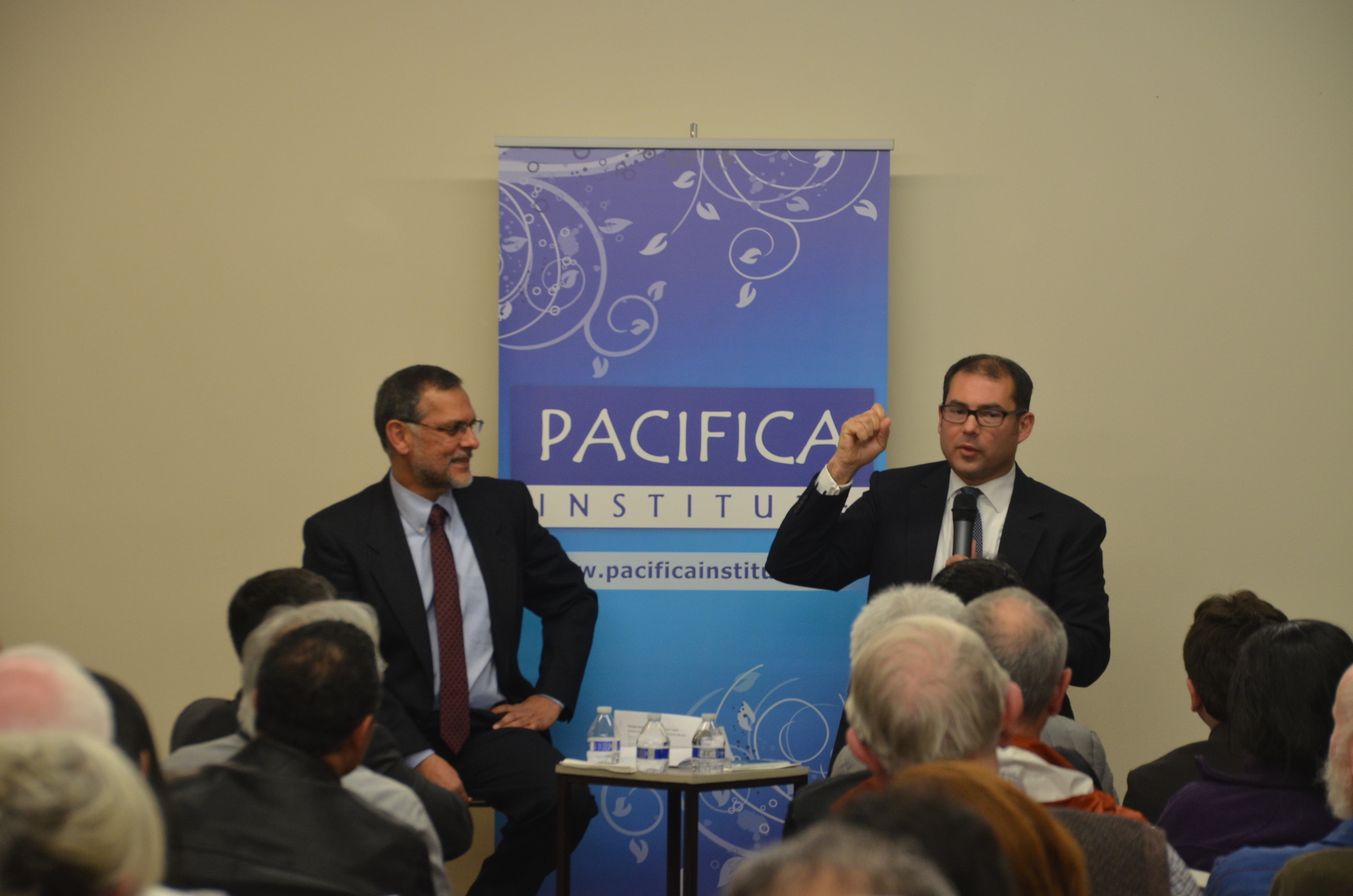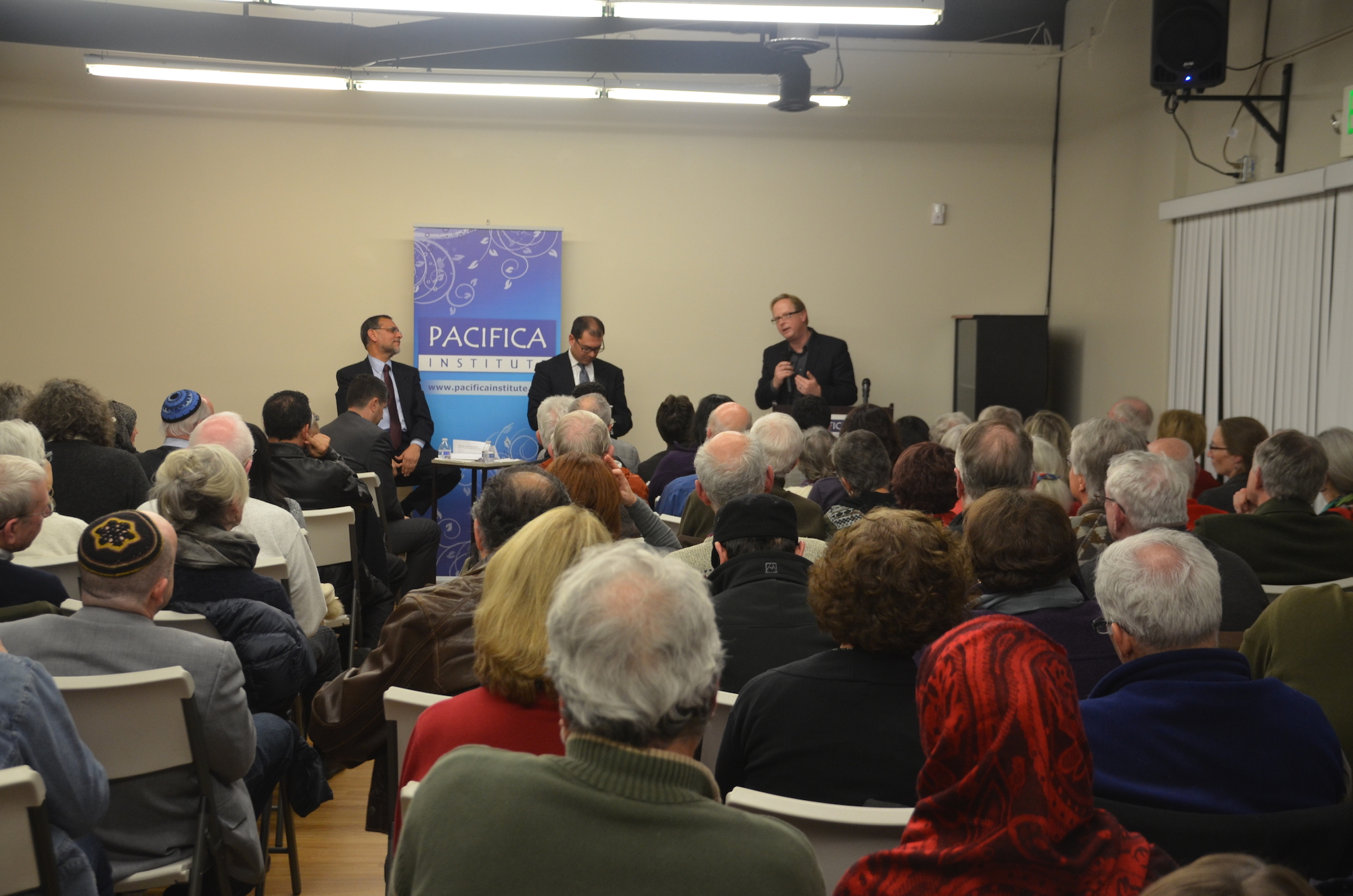In the wake of the San Bernardino shootings, the Pacifica Institute, Seattle organized a live conversation between prominent Muslim leaders on 15th December, 2015. The event aimed to provide pushback to some of the narratives about the Muslim-American community as well as speak on extremism, which was denounced as a “cancer.” An introduction of the speakers included Jawad Khaki’s status as a “perpetual immigrant,” and his history of philanthropy. Jihad Turk’s philanthropic history and work at the Bayan Claremont Islamic Graduate School was also mentioned.
On the causes of extremism, Turk referred to a book that said the Islamic world has “bloody borders.” He contrasted the earlier Islamic world of empires with the nationalism, which he describes as the current way to organize communities.
“Foucault argues that modern nationalism centers around five things: culture, history, language… attachment to a particular piece of land, and religion,” said Turk.
He ended his opening comments by arguing that ISIS is a geopolitical issue rather than a religious one, and that religion is both “an inspiration that calls us to our higher selves,” and something that “can be instrumentalized and utilized by someone with nefarious intentions [and] political purposes” to create conflict.
Khaki said that religious leadership has a responsibility to send out peaceful messages. He also gave the example of 9/11, after which he personally saw police officers and churches protecting muslim halls of prayer.
The host then asked for the appropriate course of action if a muslim youth is found to have ISIS sympathies. Turk responded by recalling his work at a summit with the heads the Department of Homeland Security, FBI, etc. on countering violent extremism. He mentioned that everyone assembled was impressed at “slick” ISIS recruitment strategies are over social media. The common qualities of a typical recruit are the presence of a “cognitive opening” (like mental issues, feeling marginalized, poverty etc.), a grievance (e.g. the notion that America is at war with Islam etc.), and direct online contact to make them feel part of a larger cause. Finally, he connected this to an instance when parents found their child was influenced by extremist ideas. Turk said his response was to bring the boy into the community, to educate him and teach him to be constructively critical of things that bothered him. He closed by saying that Imams and other religious leaders can provide an “off-ramp” for youngsters who are at risk.
Khaki said that the San Bernardino attack was a failure at “multiple levels,” including the community, school, college, and work level. He gave a personal anecdote where he encountered a black Muslim man in Tanzania who felt unwelcome into an Indian Muslim mosque. He was headed to Lahore, Pakistan to join a madrasa. Khaki finished by paraphrasing the Prophet, who said the meaning of Islam is to “worship Allah, worship the almighty God, and serve your mankind.”
The host then posed the question of how the Muslim community at large can do more to root out violent extremism, riffing off a comment made by President Obama.
Khaki gave the example of the United Muslim Foundation that works on “uniting communities through interactive community service.” He also mentioned that he felt assimilated as an American because of his education and involvement in the larger community, which is a privilege not afforded by all. He finished by calling for imams to adjust their teachings to conditions unique to the USA, mentioning the Institute in Birmingham, United Kingdom, and Turk’s own Bayan Claremont school.
Turk mentioned the need for an Islamic seminary that is uniquely American and reflects the pluralism of America. “There are over 2000 mosques in the United States,” he said, speaking of a research study he had conducted with a researcher in 2011. “Only 44 percent have a full-time imam, but 93 percent of those imams or religious leaders were born, raised, and educated abroad. An additional 4 percent were born-and-raised here but educated abroad.”
He then went on to enumerate the diversity of the American Muslim community, which is a third African-American, and two-thirds from 80 different countries.
Khaki further elaborated by calling for a need for “Muslim Public Media.”“The discussion has to happen within the muslim community,” he said. “But others have to participate.”
The host then introduced the other side of the equation, and asked what non-Muslim Americans could do to counter extremism. Turk directly addressed non-Muslim Americans. “We’re a very small percentage of the population,” he said. “We could use your help in creating spaces that help amplify the voice of the average Muslim-American.” He spoke of a recent event he attended, where the mayors of ten Californian cities joined around 1000 muslim attendees in solidarity. This event was covered by the media because of the presence of mainstream figures drawing eyeballs. Building on the topic of pluralistic societies, the host asked the question of whether Islam needs reform to make it compatible with modernity.
“Islam doesn’t need reform,” said Turk. “Muslims need reform.” He pointed to Judaism and Christianity flourishing under Muslim rule in Spain, called the Golden age of Jewish Culture in Spain,” and compared it with some of today’s muslim societies, which don’t allow women to drive, or have honor killings that go “completely against the faith.”
“Muslims need to approach it [Islam] through the lens of modernity,” said Turk.
In his turn, Khaki quoted the Quran, which states that the “community will not change until the individual transforms themselves.” He emphasized that the rituals of Islam should connect the worshippers both to God Almighty and their fellow human beings.
The next question dealt with how Muslim-Americans could reach across the aisle to some anti-Muslim political factions.
Khaki gave his own example of reaching out to the Republican caucus in Sammamish. Turk mentioned his conversations and summits with imams and pastors. One such summit had the congregation of pastors signed a pledge to “not promote Islamophobia and anti-Muslim bigotry.” On their side, the imams promised to promote religious liberty in Muslim majority countries the way it is done in the West.
The final questions were more personal, and asked the panelists about any threats they faced for their openly anti-terrorist stances, and their feelings about being Muslim-American.
Turk that despite a name like “Jihad,” he was not harassed at all, giving instances where he was contacted by rabbis and pastors after 9/11 to recite the Quran at Mass. He also warned against having a victim mentality and to look for the good in people.
Khaki, emphasized a faith in God. He said America is not a perfect country, but that he is willing to benchmark it against any other country in the world. He also spoke against the image of America as an “oppressive regime,” saying it’s the responsibility of Muslims to carry the image of America as a positive force outside.


